|
|
|
Sort Order |
|
|
|
Items / Page
|
|
|
|
|
|
|
| Srl | Item |
| 1 |
ID:
192549
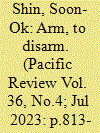

|
|
|
|
|
| Summary/Abstract |
North Korea is a de facto nuclear weapon state, having undertaken six tests between 2006 and 2017. Throughout a series of nuclear crises, since the early 1990s, Pyongyang has not only emphasised its sovereign right to explore nuclear options as an inevitable response to a hostile United States, but has at the same time consistently embraced an anti-nuclear stance, maintaining a commitment to the ‘denuclearisation of the Korean Peninsula’. This nuclear posture – ‘arm, to disarm’ – stressing the inevitability of nuclear-arming while at the same time pledging a normative anti-nuclear commitment to denuclearisation, contains seemingly irreconcilable elements. This challenges rationalist IR theories, which are unable adequately to explain the DPRK’s position, characterising it as either a tactical diversion to disguise realist motivations or a negotiation leverage to induce economic and strategic concessions. This article offers an alternative analysis, seeking to decode the DPRK’s seemingly contradictory nuclear posture by arguing that its anti-nuclear posture has deep Cold War roots aimed at hedging its security inferiority vis-à-vis nuclear-armed enemies. It focuses on the Cold War security nexus in East Asia and examines how Pyongyang’s engagement in the anti-nuclear movement evolved to shape its seemingly irreconcilable ‘arm, to disarm’ nuclearism.
|
|
|
|
|
|
|
|
|
|
|
|
|
|
|
|
| 2 |
ID:
160010
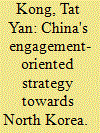

|
|
|
|
|
| Summary/Abstract |
In response to the challenge of unstable North Korea (weak economy, weapons of mass destruction [WMD] development), China has followed an engagement-oriented strategy based on diplomatic persuasion, economic interaction and moderate economic sanctions. Intensified engagement (2009–2012) facilitated North Korean convergence with China in respect of economic reform but divergence has persisted over WMD development. Despite the widening of divergence since 2013, China has refrained from applying crippling sanctions. This article seeks to explain these diverging results and their implications for China's strategy towards North Korea. Reviewing recent literature and data, it will argue that Chinese economic input reinforced the trend of economic reform that formed the basis of political consolidation under the new hereditary regime. On the other hand, the prospect of stable dependence on China ran counter to that regime's pursuit of WMDs as the basis of security and diplomatic diversification. These mixed results reveal the limits of China's strategy: its economic input involuntarily reinforces North Korea's WMD potential but it is not prepared to accept the risks of enforcing WMD restraint by crippling sanctions either. With limited room for manoeuvre, the attainment of China's strategic objectives ultimately depends upon policy change from the US or South Korea.
|
|
|
|
|
|
|
|
|
|
|
|
|
|
|
|
| 3 |
ID:
114977


|
|
|
|
|
| Publication |
2011.
|
| Summary/Abstract |
In this article, I investigate the processes of the discursive construction of the identity of Kazakhstan as a sovereign and non-nuclear state, and show how the construction and performance of these identities are both productive and the product of Nuclear Weapons Technology (NWT) as a threat to the national security of Kazakhstan. I argue that both practices - the production of the state identity and the abolition of the ex-Soviet nuclear arsenal from the territory of Kazakhstan - are instrumental ways to secure the values of Kazakhstan, in this case the existence of Kazakhstan as a sovereign state.
|
|
|
|
|
|
|
|
|
|
|
|
|
|
|
|
| 4 |
ID:
172383


|
|
|
|
|
| Summary/Abstract |
The Hanoi summit between the US and North Korea failed not because of North Korea’s brinkmanship strategy or its miscalculation of the US position on the denuclearisation talks, but because of a fundamental issue: a dilemma of how much to yield in giving up its military capabilities to expedite the lifting of sanctions. The leadership in Pyongyang has concerns about the ‘deliverability’ of its promises to its domestic audience to ensure deterrence capabilities and economic recovery. The two-level game model explains why both sides keep minimising the range of options for the negotiations, increasing the risk that the talks will break down.
|
|
|
|
|
|
|
|
|
|
|
|
|
|
|
|
| 5 |
ID:
181691
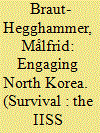

|
|
|
|
|
| Summary/Abstract |
North Korea and the United States are edging towards re-engagement. They agree in principle on pursuing a phased approach to negotiations but disagree on how to begin and what the end goal should be. A warming-up phase can allow states to informally explore specific options for future engagement. By participating in activities such as table-top exercises, simulations and familiarisation visits, the participants develop a more specific understanding of the purpose and format of the activities and verification measures that might follow a formal agreement. This process engages the technical and military bureaucracies at an early stage. It provides a private setting to raise concerns and address misunderstandings. It is an opportunity to demonstrate goodwill and interest in engagement that does not require concessions. Drawing on past examples, this article suggests specific options for a warming-up phase involving North Korea and the United States.
|
|
|
|
|
|
|
|
|
|
|
|
|
|
|
|
| 6 |
ID:
107162
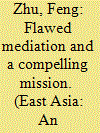

|
|
|
|
|
| Publication |
2011.
|
| Summary/Abstract |
This paper examines China's role in the Six-Party Talks, a multilateral initiative with the aim of denuclearising North Korea. As North Korea's behaviour has become increasingly provocative, evidenced by the Cheonan and Yeonpyeong Incidents and the newly unveiled uranium enrichment plant at Yeonbyon, China's indecision in dealing with the deteriorating situation has dramatically undermined Beijing's ability to continue successfully to play the leading mediator role. Yet if China fails to take decisive action now, the consequences could be dire. Further deterioration in North Korea's behaviour could trigger a nuclear arms race, severely hamper regional economic development and even create a geopolitical split in East Asia, leading to a confrontation between the US, South Korea and Japan acting together on one side, and China, Russia and North Korea aligned on the other. The factors that have prevented China from making further progress in the diplomatic process are many and various and this paper will reveal the complexity of the North Korean issue for China. Foreign academics and policy makers have tended to attribute China's indecision over North Korea to China putting its own security interests first. But this is far too simplistic a picture of the complex relationship that China has with North Korea. There are a host of factors at work that need to be taken into account to understand the present impasse in the diplomatic process. These factors include China's emotional ties to North Korea and empathy with its position as the weakest party in the Talks, the conflicting attitudes within the Chinese government itself towards the North, and the competing interests and lack of trust between the different stakeholders. It seems that for the foreseeable future, the North Korean issue will continue to plague Chinese foreign policy until all the parties involved act as a collaborative body to reach a consensus on how to resolve the situation.
|
|
|
|
|
|
|
|
|
|
|
|
|
|
|
|
| 7 |
ID:
107180


|
|
|
|
|
| Publication |
2011.
|
| Summary/Abstract |
This paper examines China's role in the Six-Party Talks, a multilateral initiative with the aim of denuclearising North Korea. As North Korea's behaviour has become increasingly provocative, evidenced by the Cheonan and Yeonpyeong Incidents and the newly unveiled uranium enrichment plant at Yeonbyon, China's indecision in dealing with the deteriorating situation has dramatically undermined Beijing's ability to continue successfully to play the leading mediator role. Yet if China fails to take decisive action now, the consequences could be dire. Further deterioration in North Korea's behaviour could trigger a nuclear arms race, severely hamper regional economic development and even create a geopolitical split in East Asia, leading to a confrontation between the US, South Korea and Japan acting together on one side, and China, Russia and North Korea aligned on the other. The factors that have prevented China from making further progress in the diplomatic process are many and various and this paper will reveal the complexity of the North Korean issue for China. Foreign academics and policy makers have tended to attribute China's indecision over North Korea to China putting its own security interests first. But this is far too simplistic a picture of the complex relationship that China has with North Korea. There are a host of factors at work that need to be taken into account to understand the present impasse in the diplomatic process. These factors include China's emotional ties to North Korea and empathy with its position as the weakest party in the Talks, the conflicting attitudes within the Chinese government itself towards the North, and the competing interests and lack of trust between the different stakeholders. It seems that for the foreseeable future, the North Korean issue will continue to plague Chinese foreign policy until all the parties involved act as a collaborative body to reach a consensus on how to resolve the situation.
|
|
|
|
|
|
|
|
|
|
|
|
|
|
|
|
| 8 |
ID:
063645


|
|
|
| 9 |
ID:
058691


|
|
|
| 10 |
ID:
058703
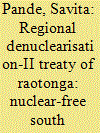

|
|
|
| 11 |
ID:
188800


|
|
|
|
|
| Summary/Abstract |
Three decades of efforts to secure North Korea’s denuclearisation failed to arrest Pyongyang’s development of a nuclear arsenal. With growing dangers of conflict escalation and nuclear use, it is time to consider alternative policies that address the reality of North Korea as a nuclear possessor state. Comprehensive arms control is worth exploring as one potential approach to managing nuclear dangers on the Korean Peninsula. Previously, conventional arms-control and denuclearisation negotiations with North Korea proceeded in parallel. However, the increasing complexity of deterrence resulting from changes in military capabilities, especially in South Korea, now necessitates a comprehensive process that creates linkages across conventional and strategic domains to address not just North Korean and South Korean, but also US, capabilities. Though comprehensive arms control promises to be politically fraught and technically complex, policymakers and experts should debate whether it could yield a more secure Korean Peninsula than existing policies that have long since failed.
|
|
|
|
|
|
|
|
|
|
|
|
|
|
|
|
| 12 |
ID:
170992
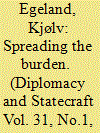

|
|
|
|
|
| Summary/Abstract |
Common knowledge has it that the end of the Cold War allowed the North Atlantic Treaty Organization (NATO) to push the nuclear genie back into the bottle. But whilst NATO members have reduced the alliance’s practical, military reliance on nuclear arms, their commitment to nuclear defence as a shared, symbolic enterprise has in fact grown increasingly explicit over time, with NATO declaring itself a ‘nuclear alliance’ in 2010. The following analysis develops two arguments. First, political responsibility for nuclear defence has shifted from individual member-states to the alliance as such; and, second, this development has been fuelled by member-states’ recurrent need to deflect criticism and adapt to the strengthening of humanitarian and anti-nuclear norms. The pulverisation of responsibility for nuclear defence in NATO has enabled pro-nuclear actors to justify costly nuclear modernisation programmes as acts of ‘alliance solidarity’ whilst exercising rhetorical coercion over advocates of denuclearisation.
|
|
|
|
|
|
|
|
|
|
|
|
|
|
|
|
| 13 |
ID:
175630
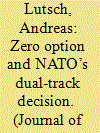

|
|
|
|
|
| Summary/Abstract |
An insufficiently understood paradox surrounded the NATO dual-track decision. This paradox was at the core of an almost classical high impact-low probability scenario which became reality with the INF Treaty of 1987, bringing NATO closer to a crisis of to be or not to be. NATO governments (except France) formally decided in 1979 that new long-range missiles in Europe were necessary but lacked political willpower to exclude the zero option, the possibility that NATO’s missile deployments may be obviated through arms control. The article analyses why this was the case, clarifies why this mattered, and draws policy implications from this crucial episode.
|
|
|
|
|
|
|
|
|
|
|
|
|
|
|
|
|
|
|
|
|